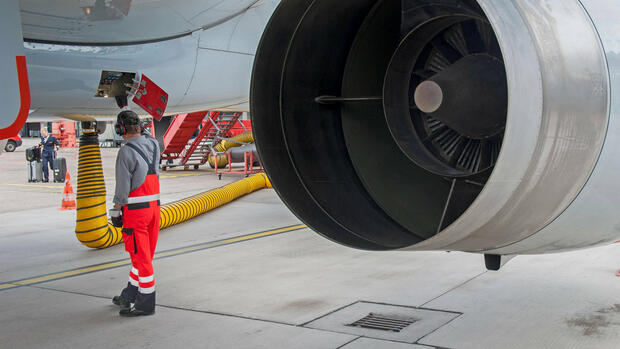Aviation will be the largest customer for the so-called e-fuel in the future.
(Photo: imago images/Joerg Boethling)
Frankfurt Visibly proud, Tim Böltken broke ground on Wednesday morning with Hesse’s Economics Minister Tarek Al-Wazir (Greens). With his start-up Ineratec, Böltken is building an industrial-scale e-fuel plant in the Frankfurt-Hoechst industrial park.
The plant is “a milestone in the development of sustainable e-fuel,” said Böltken. Al-Wazir added that it is about “producing synthetic kerosene on a much larger scale than before in order to gain experience for mass production”.
The word mass production will have been heard with joy a few kilometers away in the Lufthansa headquarters. Because aviation needs as much e-fuel or SAF as the industry calls it as quickly as possible. The synthetic fuel is intended to serve as a climate-friendly bridging technology in the airlines’ existing fleets, as the development of alternative drive concepts for aircraft is likely to take many years to come.
The aviation industry is now taking revenge for having addressed the issue of sustainability too late. Companies are in a hectic mood after the EU, for example, imposed strict emission standards on the industry from 2050 onwards.
Now it’s getting expensive: In a study commissioned by the aviation industry, the two institutes “Royal Netherlands Aerospace Center” and “SEO Amsterdam Economics” calculated that it will cost 820 billion euros to fly climate-neutrally in Europe by 2050. By far the largest block of costs are the additional costs for e-fuel at 441 billion euros. Together with the normal ongoing expenses, the researchers estimate the investments in the industry for the years 2018 to 2050 at a total of 1.9 trillion euros.
E-fuel makes the tickets significantly more expensive
The aviation industry uses these numbers to specifically seek state support. But the additional costs of around 30 billion euros per year expected in the study by 2050 are not unrealistic. Aviation experts from the management consultancy PwC assume that the more expensive SAF alone will cost a typical network airline like Lufthansa almost one billion euros annually between 2025 and 2035. If the industry had dealt with the topic of e-fuel earlier, there would probably be a lot more synthetic fuel available today – at lower prices.
Some of the passengers will have to pay for the late start of e-fuel. In a second study, the two institutes calculated the additional costs to be expected for a return flight from Hamburg to Bangkok via the Frankfurt hub.
The price for the economy ticket could rise from 815 to 914 euros by 2035. Eleven euros more would be due for emission rights, 77 euros for the added e-fuel and eleven euros for energy taxes.
With this calculation on behalf of the industry, the aviation industry wants to show that airlines with hubs outside Europe have lower additional costs and thus a competitive advantage. They only pay for their emissions for the flight between Europe and their home airports, not for the subsequent connection to Bangkok, for example.
>> Read also: In the future, aircraft will fly with hydrogen
But even without “industry glasses” it is clear that passengers will also have to pay for climate-neutral flying. Customers already pay extra with Lufthansa or Air France if they want to fly sustainably with SAF. Because the cost of SAF is two to four times that of kerosene, depending on how it is produced, and e-fuel remains a rare commodity for the time being.
The Karlsruhe start-up has started construction of an industrial-scale synthetic fuel plant in Frankfurt-Hoechst.
(Photo: INERATEC GmbH)
Production is expensive, and many companies are still reluctant to make advance payments. Around 70 companies worldwide are currently producing the synthetic fuel – albeit in very small quantities. Global SAF production currently accounts for only one per thousand of the fuel requirement in aviation.
The new plant in Frankfurt-Hoechst is still relatively small. From 2024, it will produce 2,500 tons of the synthetic fuel annually, primarily for aviation and shipping. Ineratec invests more than 30 million euros in production. The Federal Ministry for the Environment made around six million euros available for the project.
If everything runs smoothly, the factory should become a blueprint for larger plants. According to Ineratec boss Böltken, several of these are already being planned. He wants to build his company into the market leader for e-fuels.
Synthetic fuel can be produced in several ways. Basically, biofuel is produced from non-fossil and renewable raw materials in complicated chemical processes. Some companies use household waste or agricultural waste for this purpose. With the help of green electricity, water and carbon dioxide (CO2) can also be extracted from the air and processed into kerosene. This means that e-fuel has a significantly better climate balance than fossil fuels.
More: Insight Innovation – How Lufthansa wants to fly climate-neutral with solar kerosene
